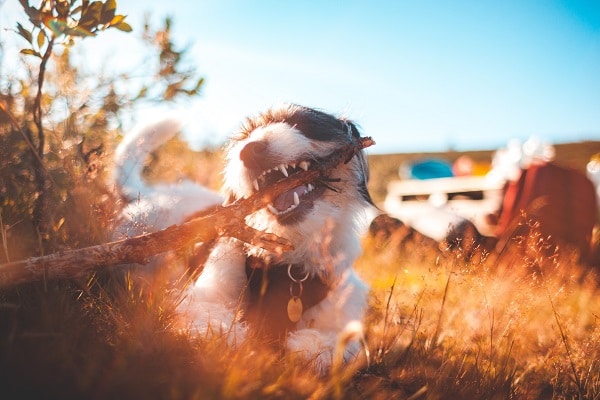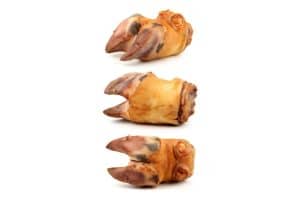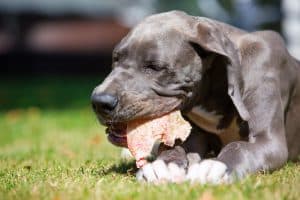Dogs of all ages and breeds like to chew things; most of them will chew just about anything until they are trained not to. This is why we give them dog toys and chewing treats so that they are able to continue what they love safely and without destroying their owner’s possessions.
Wood is something some dogs like to chew and although it seems fine to let them do it because it’s a part of nature and often when walking in the great outdoors we might use a stick to play fetch. Having wood in the mouth is fine but chewing it really isn’t something that should be encouraged and in fact, owners should actively try and stop it immediately and train them to not do it again.
This article aims to help those who are looking for the facts in relation to dogs chewing wood, why it’s such a problem and how to stop your dog from chewing wood.
Is chewing wood bad for dogs
Chewing wood is bad for your dog on so many levels you may find it distressing if you’ve been allowing it so far. Here we’ll list all of the reasons why letting your dog chew a wooden item isn’t a great idea.
Splinters
As they chew the wood it will start to break away and splinter. These splinters can stab inside the mouth of your dog and even puncture through in serious situations. At the very least they can cause serious irritations inside the mouth as they chew. Your dog’s mouth can start to bleed and cause them severe pain and anxiety will need to be looked at as soon as possible.
While the mouth is wounded this will put the dog off their food out of severe pain which can then lead to even more indirect problems down the line.
The mouth isn’t the only part of the dog which could get punctured, rough play with a stick with a sharp end can result in potential punctures to the eyes, ears, nose and even their torso if they are particularly aggressive chewers.
Digestive problems
Wood is a natural item with no nutritional value whatsoever and with that comes bacteria and fungi. Your dog could genuinely get sick from ingesting too much wood, especially chemically treated wood such as softwoods used in decking which can result in poisoning. If this happens surgery may be required if the wood treatment is small enough and the ingested wood is small enough to pass naturally.
Choking hazard
Chunks coming off of sticks and other wooden objects can cause choking in any dog being overly aggressive or careless with their chewing, this is particularly true for dogs who are chewing because of anxiety and stress. Dogs should never be left with any unfamiliar chew toys and definitely not with items made out of wood or sticks.
Second of all, if the dog is unfortunate enough to swallow pieces of wood which are not small enough to pass through the sphincter it can result in severe pain and will require surgery.
Why does my dog chew wood?

We will never know exactly why your dog chews on wood but here are some common reasons we’ve been able to curate from real owners, veterinarians and canine experts who have observed this behaviour
They have nothing better to chew
Often the correct answer is the simplest- dogs love to chew and wood is just another thing to chew. Chewing isn’t just a pastime for dogs; it also keeps their teeth clean and sharp and acts as a stress buster. If your dog is always chewing on wood then we feel it’s time for you to go shopping for new toys. We recommend indestructible dog toys that they can chew endlessly and never need wood again.
Teething
Puppies and young dogs go through an intense period of teething and chewing is the only way to alleviate the pain, much like the above point the toughness and softness of wood can make an ideal teething aid if they have nothing better available to them. If you do have a young dog and their wood chewing behaviour is happening at home with furniture then it’s time for some toy shopping.
Separation Anxiety
If your dog is chewing and destroying wood furniture in your home when you’re not there then the likelihood of the cause is severe anxiety brought on by your lack of presence and lack of training to cope with it. Separation anxiety is not uncommon in dogs but it is a behaviour that needs to be addressed or else the destructive behaviour will continue and your dog could potentially be hurt and your home ruined.
Lignophagia
Lignophagia is a subset of Pica, a disorder which leads an animal to have an urge to chew and eat non-nutritive substances, in this case, wood. It is most common in horses but some dogs in extremely rare cases can suffer it. It is unclear whether they are born with it or it is later developed but some things which correlate with Lignophagia is cold, wet weather and being confined and surrounded with a constant supply of wood and a lack of nutrition elsewhere.
This is explained in more detail later but possible prevention is to ensure the garden is clear of wood and ensure that their diet is appropriate and meets their nutritional requirements.
How to stop your dog from chewing wood
Now that we all know that chewing wood is not desirable for dogs it’s time to get them stop it for good. Here are a couple of tips to help you get started.
Positive reinforcement training
Although it seems obvious to put ‘keep them away from wood’ as the first option but we don’t feel that will teach them to stop- it will just take opportunities away but the behaviour remains as soon as they get near wood again. Therefore we recommend, as with any kind of dog training, to start with positive reinforcement.
Observe them closely and if they start to try and chew wood then give them a stern ‘no’. If they stop, give them a treat they love. If they continue to keep being firm with them and if they really do continue then give them time out (read our guide for the right way to do time out).
This isn’t the only step of course but it is perhaps the most important one. Let them know that not chewing wood has a desirable outcome for them.
Make sure they have plenty of GOOD chew toys
Chances are, your dog is chewing wood because there is nothing better to chew in the home. Perhaps they’ve made short work of toys in the past and you’ve stopped buying them to save money as it has been seen as a waste, Well, this is why we advocate and promote chew proof dog toys that will keep going for a long time and most importantly keeping your dog from chewing other things.
Why not start off with a simple Kong Classic as you can load it up with treats to entice them in the first place.
Remove all unnecessary wood and sticks from the home
You can’t get rid of the sticks from the park but you can clear your garden of any unnecessary pieces of wood to limit the occurrence in the first place. Wooden furniture is a different story so you won’t want to remove it but you can use a deterrent such as bitter apple to make them not want to go anywhere near it in future.
Improve their diet
Your dog may be malnourished and lack nutrition and they attempt to eat or chew wood out of a misplaced need to source the missing nutrients. A hungry dog can be a naughty and stupid dog. We have a section on our website for dog food and nutrition and we recommend starting there to get your dog’s diet as good as it can be.
Dogs do not know that wood is no good for them so it’s up to us as responsible owners to teach them what is.
Give them plenty of exercise
Your dog may be chewing wood furniture because they are frustrated from not being exercised enough and become naughty as a result. Even the most low maintenance dogs need exercise and social interaction from time to time. If you have a naughty dog then their routine needs to be changed – if you can’t walk them then hire a dog walker or even have some physical play in the home or garden.
A well-fed and exercised dog is a good dog that won’t be destructive and chew things that they shouldn’t.
Separation anxiety
Separation anxiety is a leading cause of destructive behaviour in dogs and could be the reason why your dog chews wood if you find it happens when you’re not there.
Related Articles




